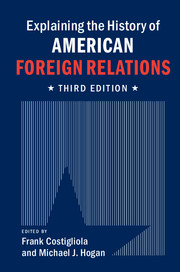Book contents
- Frontmatter
- Dedication
- Contents
- List of figures
- List of contributors
- Introduction
- 1 Theories of International Relations
- 2 National security
- 3 Corporatism: from the new era to the age of development
- 4 Explaining political economy
- 5 Diplomatic history after the big bang: using computational methods to explore the infinite archive
- 6 Development and technopolitics
- 7 Nonstate actors
- 8 Legal history as foreign relations history
- 9 Domestic politics
- 10 The global frontier: comparative history and the frontier-borderlands approach
- 11 Considering borders
- 12 The privilege of acting upon others: the middle eastern exception to anti-exceptionalist histories of the US and the world
- 13 Nationalism as an umbrella ideology
- 14 Nation Branding
- 15 Shades of sovereignty: racialized power, the United States and the world
- 16 Gendering American foreign relations
- 17 The religious turn in diplomatic history
- 18 Memory and the study of US foreign relations
- 19 The senses
- 20 Psychology
- 21 Reading for emotion
- Index
1 - Theories of International Relations
Published online by Cambridge University Press: 05 March 2016
- Frontmatter
- Dedication
- Contents
- List of figures
- List of contributors
- Introduction
- 1 Theories of International Relations
- 2 National security
- 3 Corporatism: from the new era to the age of development
- 4 Explaining political economy
- 5 Diplomatic history after the big bang: using computational methods to explore the infinite archive
- 6 Development and technopolitics
- 7 Nonstate actors
- 8 Legal history as foreign relations history
- 9 Domestic politics
- 10 The global frontier: comparative history and the frontier-borderlands approach
- 11 Considering borders
- 12 The privilege of acting upon others: the middle eastern exception to anti-exceptionalist histories of the US and the world
- 13 Nationalism as an umbrella ideology
- 14 Nation Branding
- 15 Shades of sovereignty: racialized power, the United States and the world
- 16 Gendering American foreign relations
- 17 The religious turn in diplomatic history
- 18 Memory and the study of US foreign relations
- 19 The senses
- 20 Psychology
- 21 Reading for emotion
- Index
Summary
For diplomatic historians to delve into the sub-field of Political Science that studies International Politics or Relations (terms I will use interchangeably) is to enter a world that is both familiar and different. Indeed, it is the similarities that make the differences so jarring. Just as Dean Acheson expressed his bemusement at discovering that International Relations (IR) scholars treated him as an “independent variable,” so do many historians find distasteful the notion of variables, especially ones labeled as independent (causes) and dependent (effects), studying historical events as “case studies,” seeking generalizations as wide-ranging as possible, valuing “theoretical parsimony,” with its emphasis on deploying as few independent variables as possible, and comparing cases that are dissimilar in many ways. But I believe that the very differences between the two fields make interaction potentially fruitful if historians are willing to (temporarily) suspend disbelief.
Obviously, the field of IR is too large to completely cover here, and my survey will be skewed toward international security rather than political economy, international organizations, and transnational trends and flows. In the course of this, I hope to make clear why a chapter on IR theory in some ways fits awkwardly with a book on approaches to the history of American foreign policy.
I will proceed by outlining two related ways of dividing the theoretical approaches to IR: the first between the orientations of Realism, Liberalism, and Social Constructivism, and the second sorting according to whether the main independent variables are located at the level of the individual, the state, or the international system, which lends itself to a discussion of how IR uses comparisons to try to pin down causation. I will concentrate on theories about relations among the most powerful states, which leaves out many important subjects but is most relevant to arguments about American foreign relations.
REALISM
The best known approach to IR is Realism, which comes in several flavors: classical, neoclassical, offensive, defensive, and structural. All share the common starting point that states are usually the main actors in international politics, that considerations of power and security are paramount, that states are (and should be) guided by the national interest as contrasted with sub-national or supra-national interests, and that the world is dangerous both because human nature is malign – or at least has a malign streak in it – and because this realm, unlike domestic society, …
- Type
- Chapter
- Information
- Explaining the History of American Foreign Relations , pp. 9 - 24Publisher: Cambridge University PressPrint publication year: 2016
- 1
- Cited by



